COURT BLASTS MD. RACING COMMISSION HEARING PROCEDURES, remands 2020 GEISHA STAKES CASE
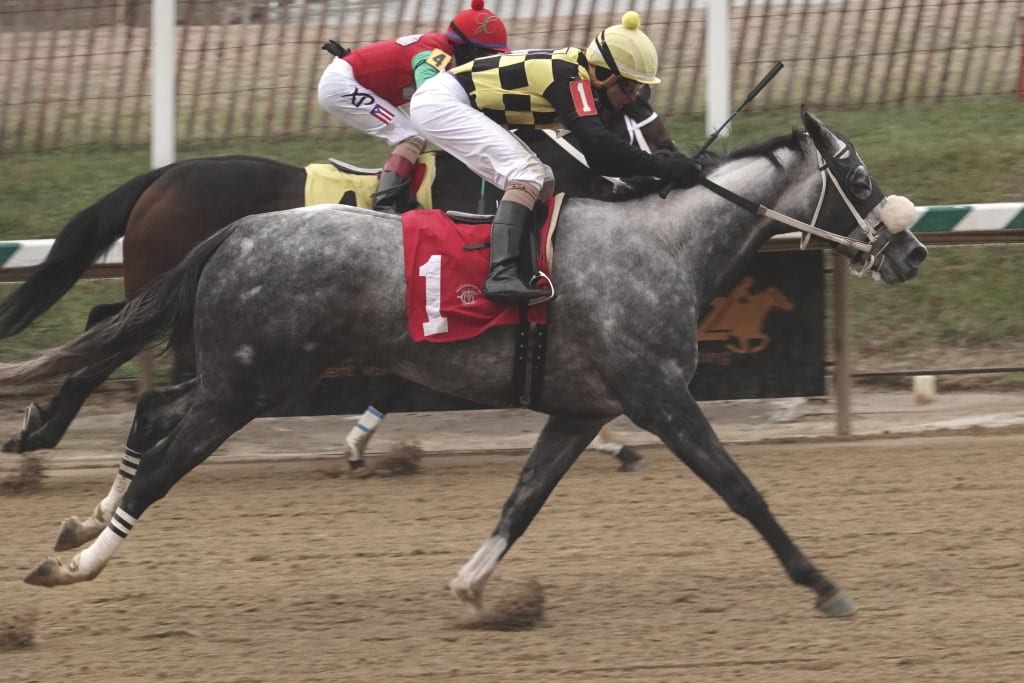
A February 9 court ruling will force the Maryland Racing Commission (MRC) to revise its hearing procedures. And it means the outcome of the 2020 Geisha Stakes remains in dispute – more than 13 months after the race took place.
“[T]he Court concludes that the hearing before the MRC did not adequately protect Petitioner against the deprivation of one of his most essential and foundational rights,” wrote Howard County Circuit Court Senior Judge Lenore Gelfman, citing the “due process right to a fair and impartial hearing.”
Therefore, she wrote, she was sending the case back to the Commission to rehear while adhering to guidelines outlined in the decision.
The case arose following the January 18, 2020 Geisha, won by Artful Splatter, who was trained by Kieron Magee for James Wolf. In mid-stretch Artful Splatter, on the lead under jockey Alex Cintron, suddenly veered out several paths – directly in front of the rallying Anna’s Bandit, under Xavier Perez.
Anna’s Bandit was forced to duck down inside her rival, and in so doing she switched back to her left – improper – lead. In the end, Artful Splatter hung on to win by a half-length.
Perez and Jerry Robb, Anna’s Bandit’s trainer and, with wife Gina, co-owner (as No Guts No Glory Farm), objected to the stewards. The stewards, however, ruled “no change,” leaving the order of finish unaltered.
Robb immediately appealed that decision to the MRC, which heard the case February 27, 2020. After a long and contentious hearing, the Commission ruled unanimously to uphold the decision of the stewards.
That led Robb to seek judicial review.
The appeal, filed by attorney Lorraine Lawrence-Whittaker, alleged that the MRC hearing was flawed in three major ways: that Robb did not receive a fair and unbiased hearing; that he was wrongly prevented from entering key evidence; and the Commission had not established clear standards by which to judge whether a horse had, for example, intimidated or impeded a rival.
For the most part, Gelfman did not rule on the latter points. That’s because she found the conduct of the hearing itself so troubling – and so damaging to Robb’s case – that it in essence trumped other concerns.
- Spa Selections 2025: Saratoga Picks July 13
 Picks and analysis for today’s key races from Saratoga.
Picks and analysis for today’s key races from Saratoga.
Maryland Racing Commission hearings are administrative hearings and are de novo, meaning they start from scratch without using prior findings of fact or legal conclusions. In these hearings, there typically is a plaintiff – in this case, Robb – and a defendant, in this case the stewards. Both are typically represented by counsel.
The Commission itself also is represented by counsel, whose job is to provide legal guidance and advice.
For at least the last several years, at hearings the Commission’s counsel – Eric London currently – has played a dual role in hearings, presiding over them while also acting as counsel to the Commission. The person presiding typically directs the hearing, rules on motions and objections, and performs other tasks similar to those a judge might undertake.
Although London did not participate in the actual rendering of a decision, that dual role brought Judge Gelfman up short.
Calling the transcript of the proceeding “remarkable,” she wrote, “This court notes that Counsel for the MRC interjected himself repeatedly, leading to the conclusion that he, not the MRC, was the decision-maker.”
That appearance, she said, was a major problem.
“Counsel’s participation and manner in the hearing deprived Petitioner of due process,” she said.
“I’ve tried cases in federal court, in state courts in many other states, and I’ve never been in a hearing that was quite like that,” Lawrence-Whittaker said in an interview. “Everything I was trained to do as a trial attorney, it was the opposite.”
She and Robb had attempted during the initial hearing to bring in a variety of evidence that was excluded. That included evidence of Artful Splatter’s prior races, in which on more than one occasion she had drifted out in the lane; and what Robb said were messages from Hall of Fame jockeys Chris McCarron and Ramon Dominguez supporting his case.
“I had a briefcase full of evidence that I wasn’t allowed to use,” Robb said at the time. “I can’t lose if I can put the evidence in.”
Lawrence-Whittaker said that the exclusion of the evidence prevented the judge from adequately assessing Robb’s case “because I wasn’t allowed to develop the record.”
Further, she argued that that evidence should have been allowed in because hearing panels like the Commission have what she called “expanded ability of bringing in evidence” in service of getting at the truth.
Yet because of the conduct of the hearing, Gelfman wrote, “It is foreseeable that the MRC’s decision was based upon an incomplete or skewed record,” which undermined “Petitioner’s ability to present his case.”
- Argyle and Thoroughbred racing in the 1830s
 Connected to Supreme Court justices and governors, the Maryland-bred Argyle became one of the best horses of the 1830s. His story.
Connected to Supreme Court justices and governors, the Maryland-bred Argyle became one of the best horses of the 1830s. His story.
Lawrence-Whittaker also argued that the MRC’s rules are impermissibly vague, lacking common definitions for terms used in the rules of the race.
“What is the standard for intimidation? What do the stewards need to see?” she wondered. “Without identifiable standards, you can never win. You can’t have equal treatment when you don’t have identifiable standards.”
While Gelfman did not take up the full range of that portion of the complaint, she did direct the Commission to refer the question of what it means for a horse to have “sufficient clearance” when crossing the path of a rival to the Equine Health, Safety, and Welfare Advisory Committee which the Legislature last year directed the Commission to create.
Michael Hopkins, Commission executive director, said that the Commission did not plan to appeal the decision and intended to comply with the judge’s order.
As for the sufficient clearance question, he said, “My understanding is that they’ll [the advisory committee] recommend the standard, but that’ll be up to the Commission.”
Michael Algeo, who was chairman of the Commission at the time of the initial hearing and is still a Commissioner, acknowledged the “appearance of a conflict” in the Commission’s conduct of the hearing.
“We respect the court’s decision and are going to rectify that,” he added.
February 25, in the first hearing following the court ruling, Commission chairman Emmet Davitt presided over the one hearing that was held.
As for her part, Lawrence-Whittaker indicated there was plenty of evidence she wanted the Commission to see when the new hearing is held.
“I’m not limited by the evidence from the first hearing,” she said. “There’s a whole world of evidence open to me… They can disregard the evidence, but they have to let it in.”
LATEST NEWS




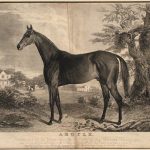
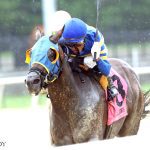
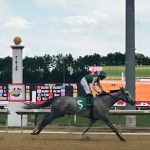

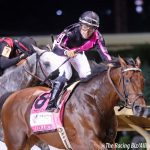







Chalk up another legal win for John “Perry Mason” Robb